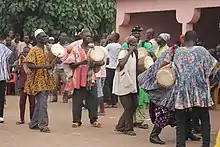Damba festival
The Damba festival is celebrated by the chiefs and peoples of the Northern, Savanna, North East and Upper West Regions of Ghana.[1] The name Damba in Dagbani, Damma in Mampruli and Jingbenti in Waali. The festival is celebrated in the Dagomba lunar month of Damba, corresponding to the third month of the Islamic calendar, Rabia al-Awwal. Damba is celebrated to mark the birth and naming of the Holy prophet, Muhammad, but the actual content of the celebration is a glorification of the chieftaincy, not specific Islamic motifs. The festival is categorized into three sessions; the Somo Damba, the Naa Damba and the Belkulsi.
| Damba festival Festival de Damba Damba chuɣu | |
|---|---|
| Genre | festivals |
| Frequency | Annually |
| Country | Ghana |

Activities
The festival starts on the 10th day of the month of Damba with the “Somo” Damba, followed by the ‘Naa’ Kings Damba on the 17th day, with the “bielkulsi”, which is the climax of the celebration, coming off on the 18th of the month of Damba. within this period, prayers are offered to ancestors, drumming and dancing, families pay visits to friends and exchange gifts.[2]
See also
| Wikimedia Commons has media related to Damba Festival. |
References
- "Festivals in Ghana". www.ghanaweb.com. Retrieved 27 December 2011.
- "Damba Festival". Visit Ghana. Retrieved 2020-01-18.